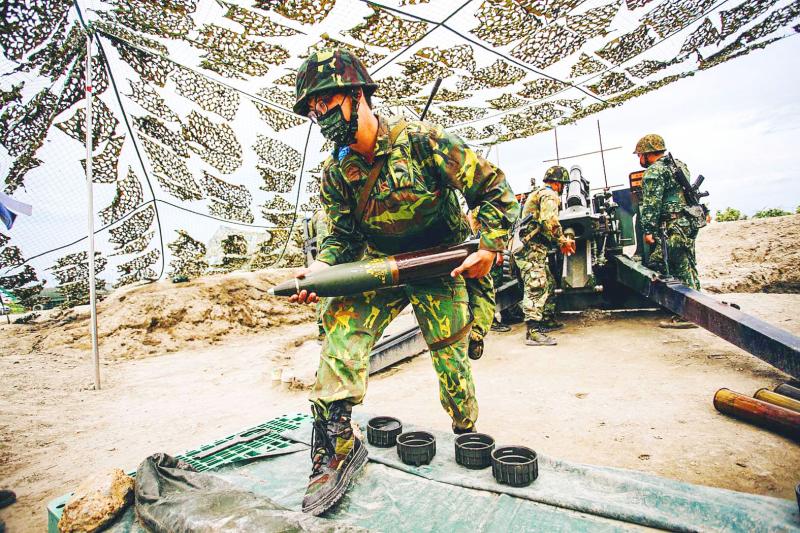The military is to form a new reserve mobilization agency while expanding the scope of civilian forces that can be mobilized as part of its efforts to bolster the nation’s reserve forces amid increasing threats from China, the Ministry of National Defense said yesterday.
The ministry made the announcement in a report it sent to lawmakers for review.
The ministry would integrate two existing military agencies — the All-out Defense Mobilization Office and the Armed Forces Reserve Command — into a “defense reserve mobilization agency” by January next year, the report said.

Photo: Tu Chu-min, Taipei Times
The structural change is part of a military reform to make Taiwan’s reserve forces a more reliable backup for regular soldiers in defending the nation, it said.
Chu Sen-tsuen (朱森村) of the All-out Defense Mobilization Office said the military is also working with the Ministry of the Interior in the hope of amending the Civilian Defense Act (民防法) to expand the scope of civilian forces and volunteers the military can call upon during peacetime and war.
The act forms the legal basis for the defense ministry to mobilize civilian forces.
It defines volunteers the defense ministry can mobilize in case of need as volunteer police officers and volunteer firefighters.
The defense ministry hopes the scope can be expanded to include volunteer workers at Buddhist and Taoist temples, as well as churches, to give the military access to extra personnel, Chu said.
Temple and church volunteers have for decades played an important role in offering post-disaster relief, including preparing food and shelter after major natural disasters or emergencies, Chu added.
The defense ministry in February said that starting next year, it would introduce new rules governing the call-up of reservists to improve their combat readiness.
Under the new policy, reservists would undergo two weeks of training rather than the current five to seven days, and could be called up every year instead of the current once every two years.
The new policy is to begin as a limited trial from next year to 2023 before full-scale implementation in 2024.
The military has also extended the period during which reservists can be called up from four times in eight years after being discharged from military service to four times in 12 years, starting this year.

Taiwan has received more than US$70 million in royalties as of the end of last year from developing the F-16V jet as countries worldwide purchase or upgrade to this popular model, government and military officials said on Saturday. Taiwan funded the development of the F-16V jet and ended up the sole investor as other countries withdrew from the program. Now the F-16V is increasingly popular and countries must pay Taiwan a percentage in royalties when they purchase new F-16V aircraft or upgrade older F-16 models. The next five years are expected to be the peak for these royalties, with Taiwan potentially earning

STAY IN YOUR LANE: As the US and Israel attack Iran, the ministry has warned China not to overstep by including Taiwanese citizens in its evacuation orders The Ministry of Foreign Affairs (MOFA) yesterday rebuked a statement by China’s embassy in Israel that it would evacuate Taiwanese holders of Chinese travel documents from Israel amid the latter’s escalating conflict with Iran. Tensions have risen across the Middle East in the wake of US and Israeli airstrikes on Iran beginning Saturday. China subsequently issued an evacuation notice for its citizens. In a news release, the Chinese embassy in Israel said holders of “Taiwan compatriot permits (台胞證)” issued to Taiwanese nationals by Chinese authorities for travel to China — could register for evacuation to Egypt. In Taipei, the ministry yesterday said Taiwan

‘LIKE-MINDED PARTNER’: Tako van Popta said it would be inappropriate to delay signing the deal with Taiwan because of China, adding he would promote the issue Canadian senators have stressed Taiwan’s importance for international trade and expressed enthusiasm for ensuring the Taiwan-Canada trade cooperation framework agreement is implemented this year. Representative to Canada Harry Tseng (曾厚仁) in an interview with the Central News Agency (CNA) said he was increasingly uneasy about Ottawa’s delays in signing the agreement, especially as Ottawa has warmed toward Beijing. There are “no negotiations left. Not only [is it] initialed, we have three versions of the text ready: English, French and Mandarin,” Tseng said. “That tells you how close we are to the final signature.” Tseng said that he hoped Canadian Prime Minister Mark Carney

POSITIVE DEVELOPMENT: Japan and the US are expected to hold in-depth discussions on Taiwan-related issues during the meeting next month, Japanese sources said The holding of a Japan-US leaders’ meeting ahead of US President Donald Trump’s visit to China is positive news for Taiwan, former Japan-Taiwan Exchange Association representative Hiroyasu Izumi said yesterday. After the Liberal Democratic Party’s landslide victory in Japan’s House of Representatives election, Japanese Prime Minister Sanae Takaichi is scheduled to visit the US next month, where she is to meet with Trump ahead of the US president’s planned visit to China from March 31 to April 2 for a meeting with Chinese President Xi Jinping (習近平). Japan and the US are expected to hold in-depth discussions on Taiwan-related issues during the